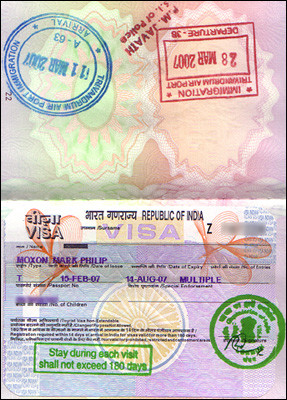Entry visas for some countries can be a nightmare, and for others they can be no problem at all. The difficulty is that the rules are different depending on the nationality of the passport you hold, the country you want to visit, the kind of visit you want to make, and the state of political relations between the two countries.
The only advice I can give on visas is to check the entry requirements with an embassy or consulate for the country you want to visit. However, here are a few examples of visas and entry stamps that I've received, just to give you an idea of what's possible, but please bear in mind that just because I managed to get into these countries on my British passport, it doesn't mean you still can, even with the same passport. Visa rules change like currency exchange rates, and the only way to cope is to be informed. Don't get caught out, or it could ruin your trip!
Australia
Australia provides some fantastic visas for young people (which they define as those under 30), but once you break the 30 barrier you're pretty much restricted to being a tourist only. If you can get one, a working holiday visa is a cracker, as it lets you live and work in Australia for a year and doesn't cost a bomb. Failing that, you can get three- and six-month tourist visas pretty easily, but you'll need enough funds to see you through your trip.
Burkina Faso
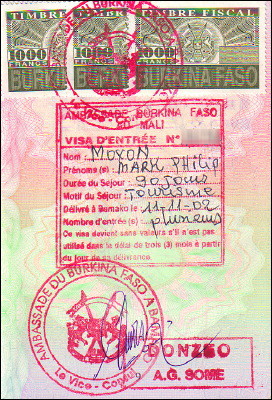
Most people pass through Burkina Faso on their way between Ghana and Mali, and if you're doing it the way I did it – Mali to Ghana – prepare yourself for a bit of a treasure hunt to find the Burkinabe embassy in Bamako. It's miles out of town, past the Medina and beyond the Hippodrome, and by far the best way to get there is by taxi, because it's tucked away in a block of anonymous concrete buildings in the middle of nowhere, and without local knowledge you could end up enjoying a tour of some of the less thrilling suburbs of the city. You need to get there early, too, so a taxi is by far the best bet.
Luckily the application process is nice and easy and the form isn't too confusing, and even better is the speedy issue of visas, a nice change from most West African countries; I dropped my application form off early in the morning, and my passport was ready for me to collect by 5pm the same day. The cost was in the region of £15, the embassy people were extremely pleasant, and there's really not much more to say. Bravo Burkina!
Cyprus
The southern half of Cyprus joined the European Union in 2004; even before this, it was a breeze for owners of a burgundy EU passport to wander through passport control without so much as a stamp. Beware of crossing into the Turkey-occupied north, though; although the form filling is a formality and there's rarely any problem with a day trip to the north, you should make sure that the Turkish authorities don't accidentally stamp your passport, or you may have problems getting back into the southern half. Luckily the border staff are pretty clued up, but it's worth keeping your wits about you to avoid any nasty surprises. Also, although we were expecting to pay for our Turkish visas, they were issued free of charge. You may have to pay, though; as ever, the rules change regularly.
French Polynesia
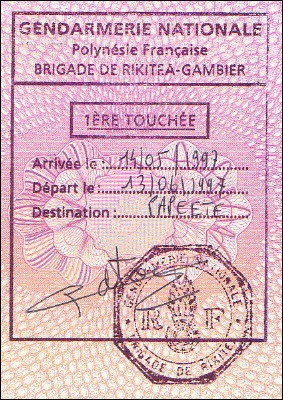
French Polynesia has practically the same entry requirements as France, so if you're European, you're laughing. I was allowed to stay for three months and didn't need a visa to enter the country; I think this also applies to most European countries, but to check your best bet is to contact a French embassy in your home country, as French Polynesia is administrated from France.
One thing that you do need to know before entering French Polynesia is that you must have either a return flight out of the country (difficult if you are entering by boat), or enough for returnable a cash deposit (that's cash, not travellers cheques or a credit card) that could buy you a one-way ticket from Tahiti to your home country. As I'd sailed in from New Zealand, I didn't have a plane ticket, so I had to have US$1600 in cash to hand over to the authorities. Without this I would not have been allowed in the country.
It's also best to have the cash in a useful currency like dollars, as you get the money back in the same currency. If you hand over francs, then you get it back in francs, which might be inconvenient if you are moving on to another country. US dollars are probably best if you haven't got a specific destination in mind, but it really depends on your plans. Check with the embassy first, though, as everything is subject to change.
Ghana
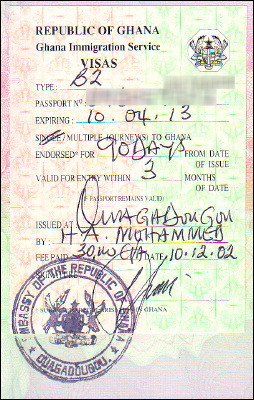
Like so many other ex-British colonies, Ghana's bureaucracy is legendary, and the form you have to fill in to get a tourist visa is long, needs to be filled out a number of times, and requires more photos than you'd think they'd need in a lifetime. On the other hand, if you're from the UK and smile a lot at the man in the embassy, the chances are you'll get your visa without any hassle.
I applied for my visa in Ouagadougou, and walking into the Ghanaian embassy was a treat, because suddenly everything was in English, from the posters on the wall to the form I had to fill in for my visa. A sign on the wall said 'All visitors entering the embassy for any negotiation are requested to be decently dressed, and there were a couple of bits on the form that made no sense at all, even in English, but I obviously managed to avoid committing any cardinal sins, and after coughing up something in the region of £15 I had my stamp. I made sure I got a multiple-entry visa, just in case I wanted to pop over the border to visit Togo and Benin, and that was that.
The Gambia
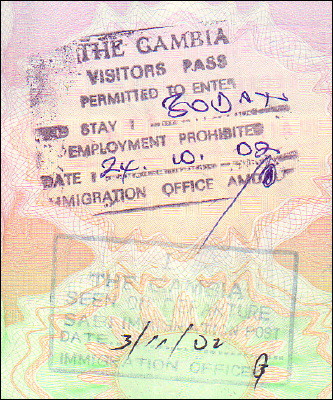
If you're from a Commonwealth country or a handful of other European countries, you don't need a visa to visit the Gambia. All you need is a valid passport and a friendly face, and the immigration people will stamp your passport with a visitor's pass that's valid for 30 days. Given the size of the Gambia, that's ample time to explore the country, and if you really need more time it's easy to pop over the border into Senegal and back to get yourself another pass (similarly you can 'extend' your Senegalese stay by popping into the Gambia for a top-up).
Indeed, the hard part of entering the Gambia isn't the immigration process, but the amazing insistence of the touts who swarm round the border (and who, interestingly, have no problem jumping back and forth across the border without any paperwork at all). You will be pestered to change CFA into dalasi until your eyes pop out of your head, but actually the deals on offer aren't too bad, and you should at least consider it. There are no queues, and it's worth thinking about.
India
India bureaucracy is legendary and most people need a visa to enter the country, but luckily it's not a nightmare to get hold of one, even though it can take a fair amount longer than the over-the-counter experience you get from the more enlightened embassies. Even if you're visiting India for a week's holiday, you'll probably be issued with a six-month visa, but they're not massively expensive, so it's no great waste of resources.
Back in 1997, I applied for my Indian visa in Bangkok, and took the easy option of getting one of the many travel agents on the Khao San Road to sort it all out for me. I was also buying a flight from Bangkok to Calcutta at the same time, so this made the whole thing extremely easy. I just handed over my passport and my payment, and a week or so later I had my flight and a visa in my passport – simple! For my second Indian trip in 2007, however, I decided to do the paperwork myself, and visited the Indian High Commission in Aldwych, London. It turned out to be an experience in itself; for more information, read my story about the High Commission.
Indonesia
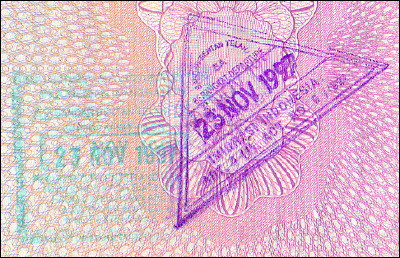
Most people get two months of visa-free travel in Indonesia, but extending this period is not really practical. Indeed, if you want more than two months in Indonesia, your best bet is to simply leave the country after two months, to wait a week or so, and to re-enter the country to get another two months.
Another requirement is, in theory, an onward flight, but I wasn't asked to show my tickets when I arrived in Bali (which was a bit of a shame as I was quite proud of the fact I'd managed to meet all the requirements). Then again you do hear of some travellers having problems, so there's no guarantee they'll let you in without a ticket if they're in that sort of mood.
Malaysia
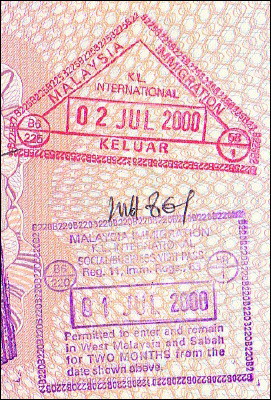
Malaysia is another trouble-free entry point for most people; on arrival, assuming you're from the right kind of country, you get a two-month entry stamp in their passport on arrival that entitles them to explore Peninsular Malaysia and Sabah (that's quite a good amount of time, to be honest).
As with Indonesia you can leave the country and re-enter to get another two months' top-up, but it's even easier with Malaysia because you have a choice between simple overland trips into Singapore or Thailand, who are also pretty chilled out when it comes to entry requirements.
The only thing to bear in mind is that this entry stamp doesn't cover Sarawak, but if you do want to go there, then you'll get another stamp in your passport when you arrive there, enabling you to explore that part of Borneo. It shouldn't cause any problems if you're able to get a normal Malaysian stamp without hassle.
Mali

Getting my Malian visa was my first experience of African bureaucracy, and although it all worked out OK in the end, I really wasn't sure what I was doing. The first hurdle was to find the Malian embassy in Dakar, which was pretty hard to track down as it had just moved (and it hadn't moved into a nice obvious new building, but into a strange blue concrete monster that looked more like a hostel than an embassy). The taxi driver eventually worked out where it was, though not before giving me a quick tour of the suburbs, but I'd arrived before opening time, so I sat on the steps to wait.
Eventually someone turned up and let me in, and armed with very little French I tried to decipher the form they gave me. If I hadn't brought my French dictionary with me I would have been in serious trouble, and although I'm sure some of my answers were complete rubbish, they accepted my form and my payment, and when I came back three days later I had a visa in my passport. As she handed it over the woman tried to tell me something that sounded terribly important but didn't contain any French words that I recognised, and eventually I just decided to smile, nod and walk off, passport in hand. Luckily that seemed to work...
Morocco
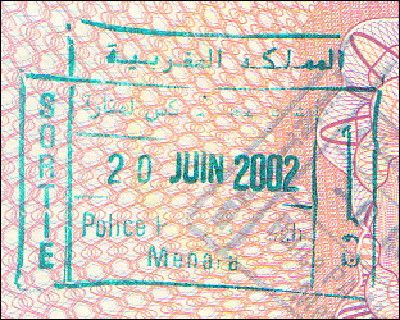
As Morocco is so close to Europe, the entry requirements for members of the European Union are hardly stringent; I didn't need a visa and could stay for 90 days without any hassle. I wasn't asked for a return flight (even though I had one), and apart from having to specify a specific hotel on arrival, it wasn't a difficult entry.
Of course, if you don't have an EU passport then things are no doubt different, and you should check. And if you're leaving Morocco for Europe overland, bear in mind they will probably search your bags; there's a large drugs trade into Europe from Morocco, and the customs men know all about it.
Nepal
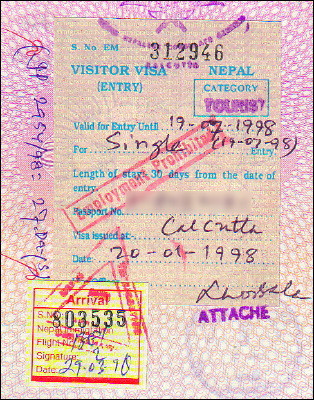
Most people need to get hold of a visa for Nepal, though these are pretty simple to pick up at Nepalese embassies (though, of course, each embassy is a law unto itself, so it's possible that out there somewhere is an embassy where the visa department runs as smoothly as the life of a Nepalese royal). I got my visa in Calcutta as soon as I landed in India, so I could enter Nepal when it was convenient, and they processed my application while I waited. The visa I got entitled me to stay for up to 30 days from the date of my arrival in Nepal.
After trekking in the Himalayas I only had a few days left on my visa, but I wanted to explore Kathmandu and eastern Nepal. Getting an extension in Pokhara was simply a matter of queuing, waiting and handing over the cash, and was no more difficult than getting a trekking permit. The extra ten days gave me ample time to leave the country at a leisurely pace.
New Zealand
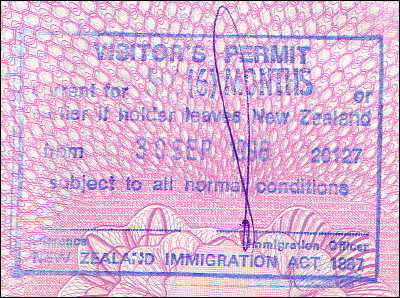
Being British, entering New Zealand was a piece of cake. I didn't need a visa, I wasn't asked to show any flight tickets (though I had them anyway) and I got a stamp in my passport giving me six months' of work-free exploring time.
Unfortunately the yacht on which I was supposed to leave New Zealand was delayed while it was hauled out of the water and fixed up for the trans-Pacific trip, and this took me beyond my allocated six months. Luckily the local customs man in Whangarei was incredibly relaxed about the whole thing, and he was perfectly happy to let me stay in his country until the yacht was ready and we could sail off into the rising sun...
Senegal
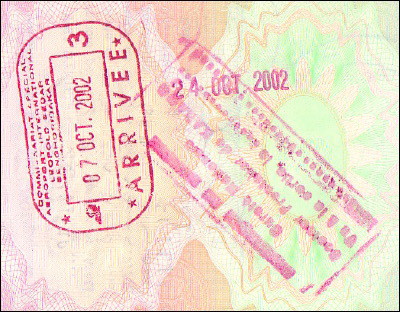
People from a handful of countries – including the UK and the USA – can enter Senegal without a visa, which makes Dakar a very handy entry point for West Africa (especially as Morocco, which is similarly easy to enter, is blocked off from the rest of the region by Mauritania, which is a pig to get a visa for). For those unlucky enough to require a visa, it's a relatively simple affair to pick one up, as Senegal is pretty switched on to tourism, being such a popular destination for the French.
I don't know if you are supposed to have an onward ticket or anything else to keep the immigration officers happy, but I sailed through the airport with minimum fuss. If only all West African countries were this easy...
Singapore
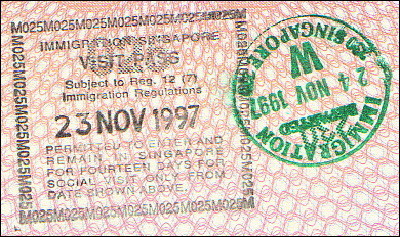
Entering Singapore was a breeze, and I was given a stamp in my passport entitling me to 30 days in the country without any hassle at all. Without a doubt, 30 days is more than enough time to explore the city. If you need to stay longer, then you're probably there on business, in which case I wouldn't have a clue what you need to do.
On leaving and re-entering Singapore (on a day trip to play golf in Indonesia, of course) I received a 14-day stamp, so if you definitely need a 30-day stamp, it's probably worth asking for one specifically, just in case.
Thailand
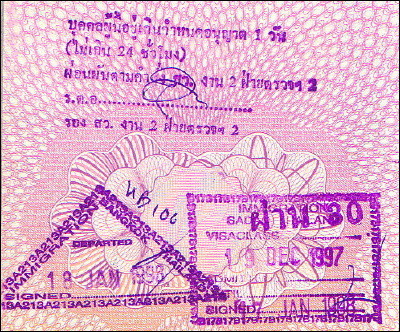
Most visitors to Thailand used to get a month of visa-free travel, but I think it's changed now. Whatever, applying for a visa is normally no hassle. You get a stamp on entering that doesn't tell you much except for the date you entered, which is probably all you need to know.
It's also possible to overstay your month by a small number of days without getting arrested: the first day or so is free, but after that you pay a fine for each day you overstay. I overstayed for one day, so all that happened on departure was that I got an extra stamp in my passport that declared I'd overstayed my welcome... but luckily the whole thing was in Thai, so it didn't caused the kind of concerned looks that an equivalent stamp in English might cause further down the line.


